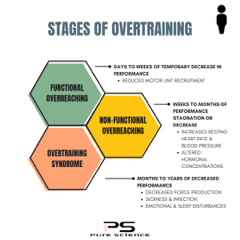Stages of Overtraining
Posted on September 15th, 2023 by Andries Lodder
By Taygan Robson, Sport Scientist and Director of Pure Science
The three 🔢 stages of overtraining can be identified as follows:
During stage 1️⃣ ,
Individuals engage in overreaching, which refers to a period of intensified training that exceeds the individual’s normal training load.
Increased fatigue, sleep disturbances, and sub-par performance characterise the initial stage of overtraining.
Additional symptoms may encompass muscle soreness, irritability, and mood swings. Functional overreaching can typically be resolved by implementing a period of reduced training load and increased rest, typically lasting a few weeks.
Stage 2️⃣ of overtraining syndrome
This stage is a more advanced form of overtraining that is characterised by persistent fatigue, decreased performance, and mood disturbances.
Additional symptoms may encompass alterations in appetite, disruptions in sleep patterns, and compromised immune functioning. The recovery period for overtraining syndrome can range from several weeks to several months.
Stage 3️⃣ of the condition is characterised by chronic fatigue syndrome.
Severe exhaustion, depression, and anxiety characterise the final stage of overtraining. Known as non-functional overreaching.
Additional symptoms may manifest, such as muscle pain, headaches, and impaired concentration. Treating chronic fatigue syndrome can be challenging and may necessitate extended rehabilitation.
Not all individuals who engage in intense training will necessarily encounter overtraining. Athletes engaged in competition preparation or performance enhancement are at a higher risk of developing overtraining syndrome. To address symptoms of overtraining, it is crucial to decrease training intensity and duration while increasing the amount of rest. In the event of persistent symptoms, it is advisable to seek medical attention from a doctor or a specialist in sports medicine.
Here are some strategies to mitigate the risk of overtraining:
👉 It is important to pay attention to your body’s signals and incorporate rest days into your routine as necessary.
👉 Avoid rapid increases in training loads.
👉 Incorporate diverse forms of exercise into your workout routine to ensure variety and balance.
👉It is important to ensure sufficient sleep and maintain a nutritious diet.
👉 Effectively manage stress and minimise exposure to additional stressors to maintain a healthy lifestyle.
👉 If you are experiencing burnout, it is advisable to temporarily cease training for a period of several weeks.
By adhering to these guidelines, individuals can mitigate the risk of overtraining and maintain their overall health and fitness.
Tweet
